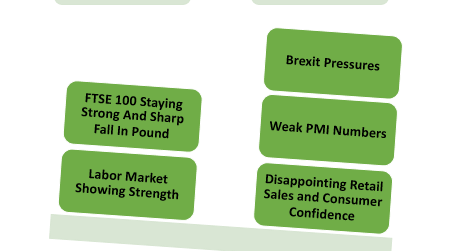Why the Bank of England Decided to Keep Rates Unchanged
The Bank of England kept interest rates unchanged at 0.5%. The asset purchase program was also unchanged at 375 billion pounds.
Nov. 20 2020, Updated 4:42 p.m. ET

Markets expected a rate cut of 0.25%
The Bank of England had its first monetary policy review after the historic referendum on June 23 when it voted to leave the European Union. We’ll focus our attention on the data release after the last monetary policy. It could have had a major say in the Bank of England’s decision on July 14. The Bank of England kept interest rates unchanged at 0.5%. There was only one dissenter among the nine members of the monetary policy committee. The asset purchase program was also unchanged at 375 billion pounds.
The pound-US dollar currency pair and the UK index FTSE 100 saw heavy movement ahead of the Bank of England’s meeting. This suggests that markets are expecting at least a 0.25% cut. It seemed that they already discounted it. So, it wasn’t a surprise that markets reacted. The pound rose by 1.5% after the release, while the FTSE also shed some of its gains.
Arguments for and against a cut
Looking at major indicators after the Brexit referendum, the PMI (purchasing managers’ index) numbers came in below the previous month’s figures in terms of services and construction. The manufacturing PMI rose to slightly offset the composite PMI number even though the composite PMI was still below the previous month’s level—it was 52.4. Another major factor suggesting a need for a rate cut is the fall in consumer confidence and disappointing retail sales numbers.
The factors that impacted the Bank of England’s decision to keep rates unchanged include the recent labor report. It was better than the previous month’s figures—unemployment fell to 5.0%. The rise in the FTSE can also point to delaying the hike, but the FTSE is run by market sentiments. Inaction by the Bank of England could result in a sudden and sharp rise in the pound. This could be negative for the FTSE.
Please refer to the below articles for more details about the individual macro indicator releases after the referendum. Read Theresa May and Shinzo Abe in Focus as FTSE 100 and Nikkei 225 Soar, Contrasting Services PMI from the Eurozone and the UK, UK Construction PMI Contracts Due to Uncertain Brexit Implications, EWU Strengthened, United Kingdom’s Economy Rose by 2%, and Pound Sterling Falls to 30-Year Lows as Britain Exits the EU.
UK and Europe-related ETFs
Looking at the performance of the United Kingdom–related ETFs, the iShares MSCI United Kingdom ETF (EWU) fell by 0.19% on July 13. The First Trust United Kingdom AlphaDEX ETF (FKU) was also trading negative—it fell by 0.77%.
European ETFs were trading with a positive bias as the iShares MSCI Germany ETF (EWG) and the iShares MSCI Switzerland Capped ETF (EWL) rose by 0.16% and 0.37%, respectively. On a broader note, the Deutsche X-trackers MSCI Europe Hedged Equity ETF (DBEU) rose by 0.16%.
